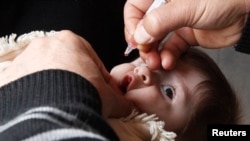WASHINGTON —
Public health workers are spreading out across the Middle East to deliver polio vaccine to more than 23 million children in the second round of the largest vaccination campaign ever held in the region. The effort follows an outbreak of the crippling disease in Syria that has claimed 17 victims so far.
Vaccinators working to contain the outbreak must reach every child under the age of five in the seven countries in the region, an already complex task made that much more difficult by the civil war raging in Syria.
The first round of vaccinations last month reached more than 2 million Syrian children, according to UNICEF spokeswoman Juliette Touma.
“Around 600,000 were in contested areas where it was hard to reach. But it’s obviously not enough. There are children that are trapped in sealed-off areas that we could not reach that we really need to reach, and we do hope to reach in the second round,” said Touma.
Some opposition groups reported that they have been unable to get vaccine because U.N. agencies that run the polio campaign must work with sovereign governments.
Touma said the campaign is negotiating with all parties to try to get access to as many children as possible.
“What we need to have is a commitment for us to access children wherever they are, regardless of their family’s political affiliation, because polio does not know borders, does not know checkpoints, does not need a visa,” said Touma.
The highly contagious virus spreads through contaminated food and water. Most of its victims are children.
Full protection requires multiple doses of vaccine; four more rounds of vaccination are planned after this one, which will last about a week.
Touma said the outbreak makes a bad situation worse.
“Syria has been polio-free since 1999. And then suddenly, on top of everything, as if we needed something else to increase the suffering of children, we have polio,” she said.
There have been 355 cases worldwide this year, up from last year’s total of 205. An outbreak in Somalia has claimed 183 of those victims this year and spread the disease to Kenya and Ethiopia, which had been polio-free.
Vaccinators working to contain the outbreak must reach every child under the age of five in the seven countries in the region, an already complex task made that much more difficult by the civil war raging in Syria.
The first round of vaccinations last month reached more than 2 million Syrian children, according to UNICEF spokeswoman Juliette Touma.
“Around 600,000 were in contested areas where it was hard to reach. But it’s obviously not enough. There are children that are trapped in sealed-off areas that we could not reach that we really need to reach, and we do hope to reach in the second round,” said Touma.
Some opposition groups reported that they have been unable to get vaccine because U.N. agencies that run the polio campaign must work with sovereign governments.
Touma said the campaign is negotiating with all parties to try to get access to as many children as possible.
“What we need to have is a commitment for us to access children wherever they are, regardless of their family’s political affiliation, because polio does not know borders, does not know checkpoints, does not need a visa,” said Touma.
The highly contagious virus spreads through contaminated food and water. Most of its victims are children.
Full protection requires multiple doses of vaccine; four more rounds of vaccination are planned after this one, which will last about a week.
Touma said the outbreak makes a bad situation worse.
“Syria has been polio-free since 1999. And then suddenly, on top of everything, as if we needed something else to increase the suffering of children, we have polio,” she said.
There have been 355 cases worldwide this year, up from last year’s total of 205. An outbreak in Somalia has claimed 183 of those victims this year and spread the disease to Kenya and Ethiopia, which had been polio-free.




